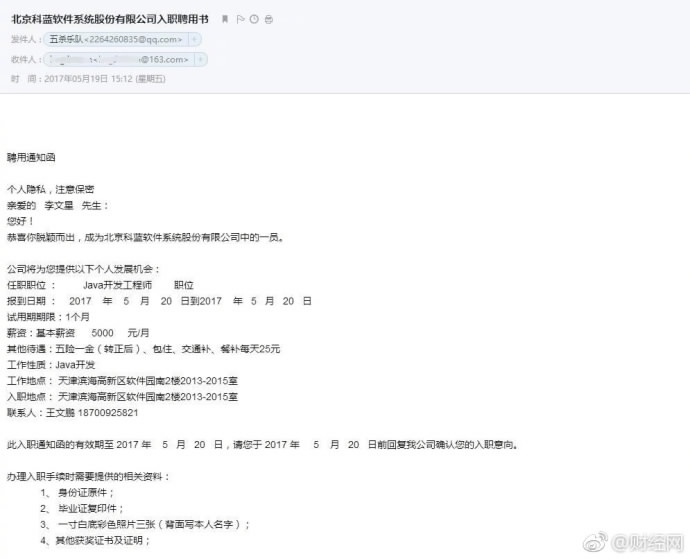Li Wenxing was found dead in a puddle in Jinghai District, north China's Tianjin Municipality on July 14. The young man is believed to have been lured by a pyramid scheme which posed as an IT company on a recruitment platform.
When Li's story emerged, so did such questions as if he was murdered or a desperate Li took his own life.
Mystery is still shrouding the young man's death as investigation into the case seeks answers to a host of questions, including the reliability of online job markets, which are considered as a crucial lifeline for talented yet unemployed youth.
A glimpse of hope after successive failures
Li majored resource exploration engineering at the Northeastern University, but it came out that he never liked his major.
Hoping to find his career path in China's booming IT industry, he signed up for coding courses in Beijing last July, with the tuition fees estimated at 16,000 yuan (2,380 US dollars), a big burden on his family in the rural outskirts of the city of Dezhou, in eastern Shandong Province.
“Since March, Li started looking for a new job through a phone application called Boss Hiring (Zhipin.com),” Hu Ze, Li’s roommate told the Beijing News. “He managed to secure interviews at 10 different occasions, but was not hired" by any of the companies, he said.
But the string of misfortunate events was about to take a turn for the better, or so Li thought.
On May 15, a person who identified himself as Xue Tingting contacted Li through the online platform, asking if he would like to join a project in Tianjin run by a company called Kelan.

Screen shots of the conversation between Li and Xue. /Photo via Caijing.com
“The project will last for two months,” Xue told Li. “You will be sent back to our headquarters in Beijing afterwards.”
An interview call took place on May 18. The next day, Li received an employment acceptance email from Kelan Company.

Li's job offer. /Photo via Caijing.com
Li set off to Tianjin two days later.
On the afternoon of May 20, he texted his roommate Hu, telling him he is safe and sound in Jinghai District in Tianjing. However, Li’s sister received two messages from him on the same day, in which he informed her he is in Binhai District.
“He was then out of reach for five days. He asked me if I could lend him 500 yuan (74 US dollars),” Hu told the Beijing News.
“Without any friendly greetings, he asked for another 500 yuan on June 8.”
Li’s high school classmate Wang Sheng also told Tianjin police that Li borrowed money from him -- on June 8, as well.
“He told me he had left Tianjin and he was now employed in Shijiazhuang (in northern Hebei Province) as he had relatives there,” Wang said.

The account of Kelan Company on Boss Hiring. /Photo via Caijing.com
Li’s family denied later on having any close relatives in Shijiazhuang.
“I wanted to visit him in Tianjin, but he told me he is traveling between Tianjin and Shijiazhuang, so I nixed the plan,” Li Wenyue, Li’s younger sister, told the Beijing News.
“We did sense he was being weird.”
The last call took place on July 8, when Li phoned his family warning them not to trust anyone who contacts them for money.
"Do not believe anyone who calls you for money," Li's mother quoted her son as saying.
The body, the notes and the vague circumstances
On July 14, a body was pulled from a puddle in Jinghai District, with no signs of physical injuries.
The ID card found in one pocket showed it was the body of Li Wenxing.

The puddle where Li Wenxing's body was found. / Photo via Caijing.com
Pages of notes were also retrieved, showing that Li might have been involved in a pyramid scheme, according to an investigation statement issued by local police on Wednesday.
A pyramid scheme works by asking members of an organization to sell goods or services through other participants rather than directly to clients. Previous victims recalled being brainwashed through classes about the product or the service, and at times detained.
The Jinghai District, where Li was working, is reportedly the largest hub for such illegal practices, though outlawed in 2009.

Li Wenxing graduated in June 2016./ Photo via Caijing.com
Li seemed to have suspected the company in Tianjin a fake firm connected to illicit and fraudulent activities as he had told a friend of such concerns.
Even before his departure to Tianjin, he found that the online account of the company that recruited him was deleted.
However, that did not deter him from taking a leap of faith, unknowing that it will lead to his demise.
Four years earlier, the bright young man, who scored 630 points on the national college entrance exam, rejected a university offer as his family could barely afford the tuition fees.
The blame game
If the suspected company was fictional and not registered, how could its representative, Xu Tingting, passed the qualification procedures on the online platform?
According to the Beijing News, dozens of college graduates have received questionable job offers through the platform with many encouraged to travel Tianjin.
One unnamed student from east China’s Jiangsu Province said he received an offer with an unexpected high pay, but his recruiter asked him to move to Xiqing District in Tianjin. He conducted research online and found accounts of similar experiences that turned out to be cases of fraud, so the prospective employee turned down the position.
Boss Hiring was launched in July 2014, offering a platform for direct communication between job seekers and senior executives of companies. By July 2016, a total of 9.16 million job seekers and 1.54 million company managers had registered on the platform.
Boss Hiring admitted negligence on Thursday in the vetting of potential employers, Global Times reported.
"It is our fault that we failed to update our rules. The incident taught us a painful lesson. We have been vetting all employers on our platform before posting job openings starting August 3."
A reporter from the Beijing News attempted to register as a company manager on Boss Hiring and succeeded, exposing the weakness of measures the company has in place to verify the identity of individuals or entities looking to register.
The reporter received over 150 job applications within three hours, without any inquiries being placed.
Many netizens expressed their anger on China’s Twitter-like Weibo.
“One of my colleagues was trapped in a similar organization but he managed to seek help. He badly cried when he saw his father. Pyramid schemes can destroy families,” said user @Neal_Hickory_Li.
“I used the same application before. I got a slew of job offers right after registering. I deleted it straight away. I knew it was fake,” noted @MaosantangtangWWW.









